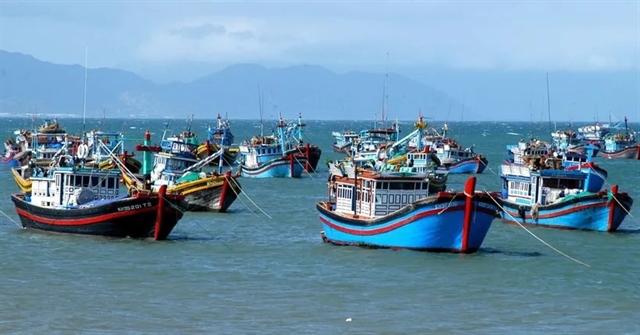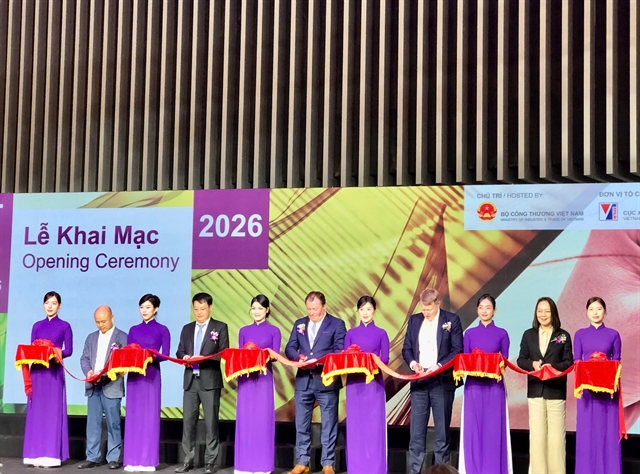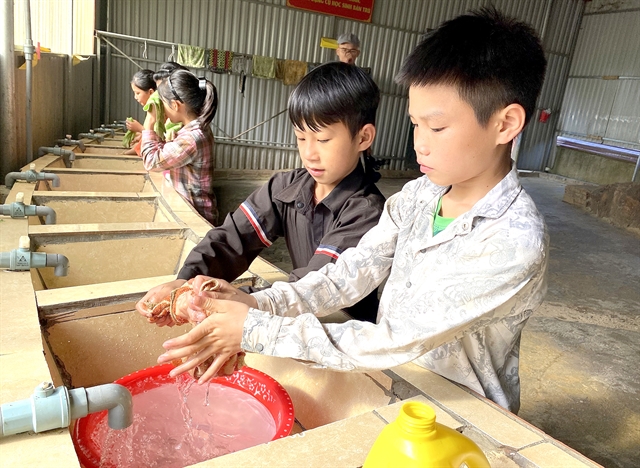 Society
Society

 |
| Students use hygienic water in Tả Gia Khâu Primary School in Mường Khương District in the northern mountainous province of Lào Cai.—VNA/VNS Photo Quốc Khánh |
LÀO CAI — The northern mountainous province of Lào Cai’s administration has invested in building 1,101 concentrated rural water supply works and deployed policies to support local residents to build household-scale water supply works over the past years.
The move aims to increase the rate of sustainable rural water supply works after statistics showed that the province only has 26 per cent of sustainable rural water supply works so far.
Hoàng Văn Minh, a resident living in Nậm Hốc Village, Văn Bàn District, said it was difficult to get stream water to serve daily life before.
Since the village had a concentrated rural water supply built about ten years ago, local residents can use hygienic water at home instead of going to the local stream every day, he said.
“People no longer worry about children suffering from diarrhoea, worms and eye pains,” he said.
By the end of last year, the proportion of households using clean water in the province reached 96 per cent.
The proportion of households using water from concentrated rural water supply works accounts for 38.6 per cent and the proportion of households using from household-scale rural water supply works accounts for 57.4 per cent.
Unsustainable water supply works
However, the province is still facing shortcomings and challenges in rural water supply works, which need to be solved in the coming time.
Director of the province’s Agriculture and Rural Development Department Đỗ Văn Duy said 460 concentrated rural supply works were rated as unsustainable in operation, accounting for 55 per cent of the total.
The works have failed to meet criteria as the water quality does not meet national standards; the rate of households receiving the water is less than 60 per cent; the supply is not regular, and the administrators failed to collect water fees from local residents, he said.
The province also has 159 concentrated rural water supply works which are not working, he said.
These have a life of 10 to 20 years but have been damaged due to floods and landslides. They are no longer able to repair or restore, he said.
A total 5,343 rural households, accounting for four per cent of the total number of rural households in the province, are using water sources from small water supply works that they built on their own. The water sources are unsanitary, he said.
Solutions
Duy said the province will coordinate with local authorities to annually review to ensure an optimal number of households have access to hygienic water sources and encourage local people to move their toilets and livestock barns away from domestic water sources.
The department also has piloted a model of small-scale water treatment and storage at households in rural areas, contributing to ensuring a safe living environment, protecting health and improving the quality of life of local people in Hoàng Thu Phố Commune in Bắc Hà District and Hòa Mạc Commune in Văn Bàn District, he said.
The department is assessing people's demand for hygienic water to submit to the provincial People’s Committee to invest in constructing more concentrated rural water supply works in ethnic-minority areas or areas having difficulties in seeking water sources, he said.
The department has said the provincial People’s Committee will require investment and operation of water works based on the principle that at least 90 per cent of total households in the areas, where the works are set up, have to register to use water and commit to paying fees as regulated, he said.
The department assigned non-profit units to manage 27 works and local enterprises to manage 32 more to improve the efficiency of management and operation of the concentrated rural supply works, he said.
Currently, these works are evaluated for effective operation and the pilot will be replicated in the near future, he said. — VNS




